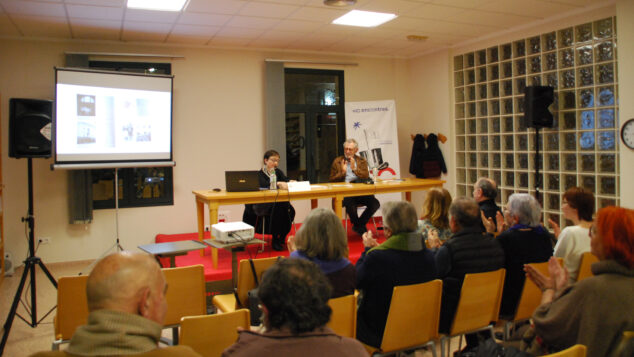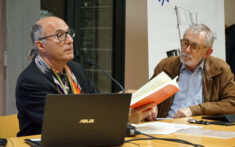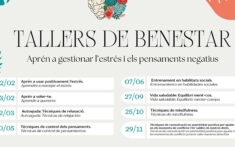The last conference of Findes a Beniarbeig 2024 focused on "Conceptual art against decadent feixisme." The talk was given by Pilar Parcerisas, who explained to the public the reaction of a generation born in the post-war period that turned its artistic proposal into political art. Before introducing the speaker, Tomás Llopis announced the new date for the postponed meeting on February 8. «Feixisme and avantguardes. L'art no és mai neutral», which will be directed by Joan M. Minguet, will finally take place next Thursday, March 7.
Next, Llopis highlighted Pilar Parcerisas' approach as an exhibition curator in the presentation of the guest to the spectators. She thus underlined her extensive resume that includes exhibitions such as Ideas and attitudes. Environment of conceptual art in Catalonia, 1964-1980 and posts like Conceptualism(s). Poetic, political and peripheral. About conceptual art in Spain, 1964-1980.
Parcerisas began his intervention by referring to his aforementioned book, where he reviews conceptual art in Spain during the sixties and seventies, a time in which the Franco regime, although weakened, reinforced its repressive apparatus. This situation led a generation of artists to rebel against the concept of the state associated with authoritarian figures such as the father, the family, religion and politics, creating avant-garde art with a strong political charge and a new visual language.
The speaker highlighted the importance of artistic movements in Catalonia, especially the Grup de Treball, which questioned the art of style in favor of an art of attitude, rejecting the artistic object in favor of more mental proposals and involving the viewer. This energy was channeled towards the transformation of the artistic institution with the insertion of political praxis and class struggle in artistic activity.
Parcerisas exhibited several works by these artists, including posters of solidarity with the labor movement and projects such as “Recorreguts,” which sought to raise funds for political prisoners. He also mentioned the politicization of 1974 and the death of Puig Antich, as well as the participation of artists such as Ferran García-Sevilla, Jordi Benito, Fina Miralles, and others in the conceptual program.
The event concluded with a colloquium where the public expressed their interest in this exhibition as an uncomfortable, but precise testimony of its time, according to the principles of committed artists who challenged fascism without giving up their craft.







